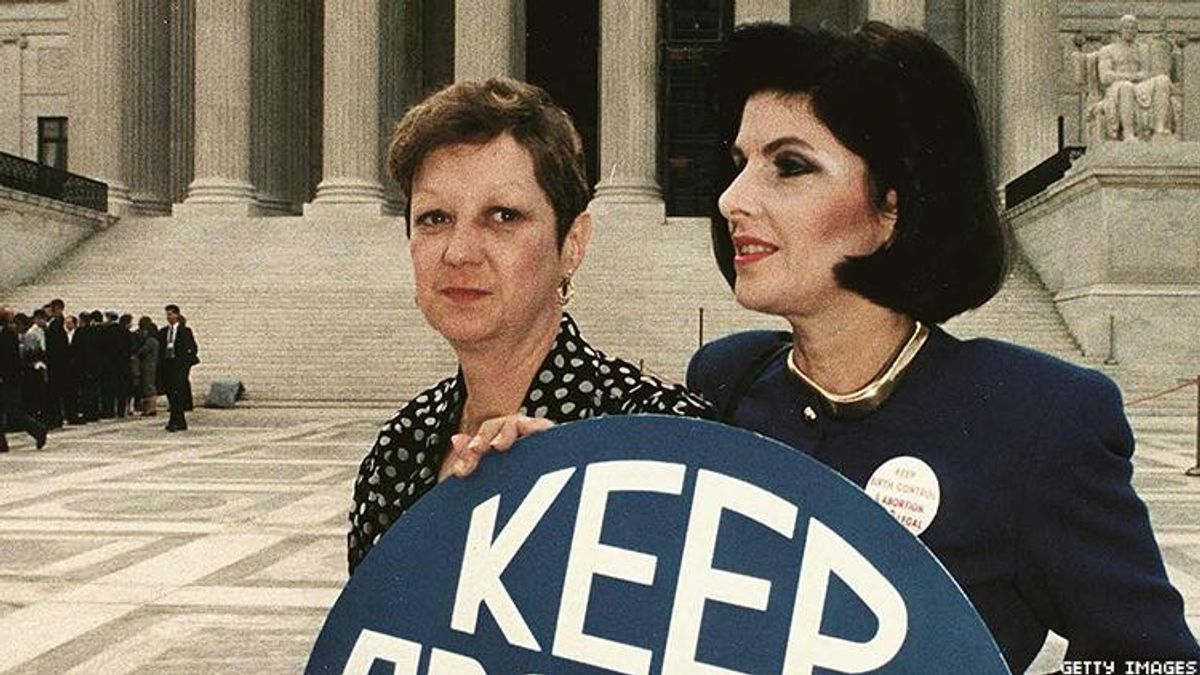On Friday, thousands of anti-abortion protestors descended on the National Mall to voice their dissent at Roe v. Wade, the Supreme Court decision that 40 years ago struck down abortion bans. Probably the most contentious high court decision ever, Roe always seems to hang by a thread. What many don't know is that the woman behind Roe, Norma McCorvey, identified as a lesbian at one point. Read her fascinating story below:
One of the most famous cases involving a lesbian has little to do with sexual orientation -- but it effected a sea change in women's rights for a lifetime. Norma McCorvey was a part-Cajun high school dropout who grew up a Jehovah's Witness in Louisiana and Texas. She dropped out of high school at 14, married at 16, and divorced her abusive husband soon after. Pregnant, she resumed living with her mother in Dallas, and she eventually gave birth to a daughter. McCorvey's mother, however, kicked her out and took custody of the daughter away after McCorvey confessed that she was attracted to women. Her occasional relationships with men led to a second pregnancy at 19, and she gave the child up for adoption. In 1969, when she was 21, she became pregnant again and tried to obtain an abortion in Texas first by claiming rape, which failed because there were no police reports. Later she attempted to visit an illegal clinic, but also failed because the clinic had been shut down recently by police.
She hired an attorney and sued for the right to an abortion, and her case became known as the landmark Roe v. Wade, the U.S. Supreme Court case that broke new ground regarding women's reproductive rights. After the Supreme Court handed down its decision January 22, 1973, it ruled all anti-abortion laws unconstitutional, thus nullifying them in every state. After the ruling, McCorvey told the Baptist Press, a news service, that she was the "Jane Roe" of Roe v. Wade, saying she initiated the case, she had no job, a 10th-grade education, and no money to travel to a jurisdiction where abortions were legal. "I felt there was no one in the world who could help me," she said.
In her 1994 memoir, I Am Roe, McCorvey discussed being a lesbian, and after the book's publication she talked to dozens of reporters from mainstream and LGBT media about her longtime partner, Connie Gonzales, and their life together in Texas. "We're not like other lesbians, going to bars. We're lesbians by ourselves. We're homers," she told The New York Times.
But soon after, McCorvey sang a different tune. First she converted to Christianity and became a part of the anti-abortion movement, telling reporters she was sorry about the precedent she set with Roe v. Wade. Then she was baptized as Catholic and told reporters she was also no longer a lesbian, even though she continued to live with Gonzales.
The anti-abortion movement was galvanized by McCorvey's changed tune and she became a public leader on the issue, speaking at ministries, colleges, and rallies against abortion. In 2005 she petitioned the Supreme Court to overturn Roe v. Wade, but the court refused to take the case.
In 2006, however, The Washington Times reported that she was caring for her "longtime friend Connie Gonzales" who had suffered a stroke, and destitute because she could no longer travel for speaking engagements (her main source of income for many years). But by 2009 she was back on the circuit, with Randall Terry's Operation Rescue and her own organization Roe No More, even getting booted by cops while protesting at a confirmation hearing for then-Supreme Court nominee Sonia Sotomayor. --additional reporting by Neal Broverman



















































































